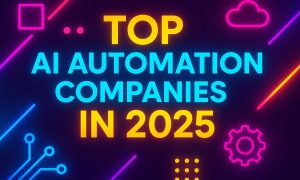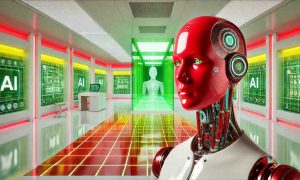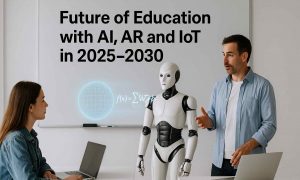

Artificial Intelligence (AI) has become a cornerstone for business transformation, streamlining operations and enabling new capabilities across industries. Below are 15 examples of how businesses and enterprises are leveraging AI for automation.
1. Robotic Process Automation (RPA)
RPA automates repetitive tasks such as data entry and invoice processing. For instance, UiPath and Automation Anywhere are leading platforms that integrate AI to enhance their RPA capabilities, enabling businesses to automate complex processes like customer support and finance operations. This results in significant cost savings and efficiency improvements for companies.

2. Predictive Maintenance
Manufacturing companies like Siemens and GE use AI to predict equipment failures before they happen. By analyzing data from sensors, these AI systems can schedule maintenance activities proactively, reducing downtime and operational costs. This predictive capability is crucial for industries relying on heavy machinery and continuous operations.
3. AI in Customer Service
AI-powered chatbots like those from Zendesk and LivePerson are transforming customer service by handling a wide range of inquiries. These systems use natural language processing (NLP) to understand customer queries and provide accurate responses, reducing the need for human intervention and improving response times.

4. Personalized Marketing
Companies like Amazon and Netflix utilize AI to analyze customer data and provide personalized recommendations. This use of AI not only enhances the customer experience but also increases sales and user engagement by delivering content and product suggestions tailored to individual preferences.
5. Fraud Detection
Financial institutions like JPMorgan and PayPal use AI to detect fraudulent activities in real time. Machine learning models analyze transaction patterns and user behavior to identify anomalies, enabling the prevention of fraudulent transactions before they are completed. This is essential for protecting customer assets and maintaining trust.

6. AI in Human Resources
AI tools like those from Workday and IBM’s Watson are revolutionizing recruitment by automating the initial screening of resumes and even conducting preliminary interviews. This speeds up the hiring process and ensures that candidates are matched with the right roles based on their skills and experience.
7. Supply Chain Optimization
Retail giants like Walmart and Zara leverage AI for demand forecasting and inventory management. By analyzing historical sales data and market trends, these AI systems optimize inventory levels, reducing stockouts and overstock situations, and improving overall supply chain efficiency.
8. Autonomous Vehicles
Companies like Tesla and Waymo are using AI to develop self-driving cars, automating transportation and logistics. These vehicles use a combination of computer vision, deep learning, and sensor fusion to navigate and make real-time decisions, potentially transforming industries like ride-sharing and goods delivery.

9. AI in Healthcare Diagnostics
Healthcare providers are using AI to assist in diagnostics and patient care. Companies like IBM Watson Health and Google’s DeepMind are applying AI to analyze medical images, detect diseases, and even suggest treatment plans. This not only improves diagnostic accuracy but also speeds up the process, allowing for better patient outcomes.
10. Financial Trading
AI algorithms are increasingly used in algorithmic trading to analyze market data and execute trades at optimal times. Firms like BlackRock and Goldman Sachs employ these AI systems to predict market trends and automate trading decisions, reducing human error and enhancing profitability.
11. Natural Language Processing for Document Automation
Legal and financial services firms are using AI to automate document processing. Platforms like Kira Systems and Ross Intelligence analyze legal documents, extract relevant information, and even predict case outcomes based on historical data, saving time and reducing costs in document-intensive industries.
12. AI-Driven Business Insights
AI tools such as Microsoft’s Power BI and Tableau use machine learning to analyze business data and generate actionable insights. These platforms help businesses understand market trends, customer behavior, and operational inefficiencies, enabling data-driven decision-making.
13. Automated Content Creation
AI systems like OpenAI’s GPT models are being used to generate content for marketing, news, and social media. These models can create articles, product descriptions, and even generate creative ideas for campaigns, significantly reducing the time and cost associated with content creation.
14. AI in Cybersecurity
AI is playing a crucial role in enhancing cybersecurity by automating threat detection and response. Companies like Darktrace and CrowdStrike use AI to monitor network activity, detect suspicious behavior, and respond to potential threats in real time, protecting businesses from cyberattacks.
15. Virtual Personal Assistants
Enterprises are using AI-powered virtual assistants like Alexa for Business and Google Assistant to automate routine tasks such as scheduling meetings, managing to-do lists, and even controlling office environments. This helps improve productivity and allows employees to focus on more strategic activities.
Conclusion
AI automation is transforming business processes across industries, offering unprecedented levels of efficiency, accuracy, and innovation. From customer service to financial trading and supply chain management, AI is enabling businesses to automate complex tasks and make data-driven decisions. As technology continues to evolve, we can expect even more groundbreaking applications of AI in the enterprise space.
References
- Financial Times, “Artificial Intelligence in Business,” available at FT.com(Financial Times).
- TechCrunch, “Enterprise AI and Automation,” available at TechCrunch.
- Bloomberg, “AI in Financial Services,” available at Bloomberg.
- Forbes, “Top AI Trends to Watch,” available at Forbes.



























